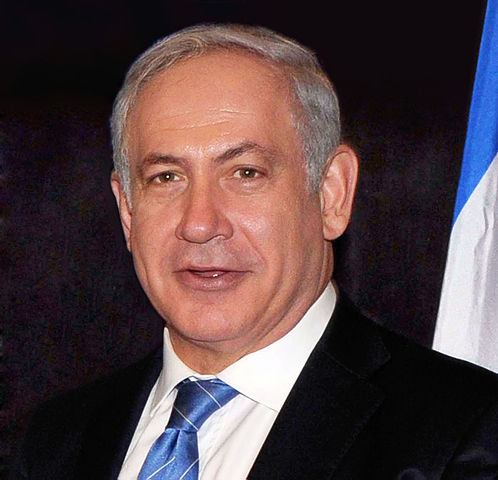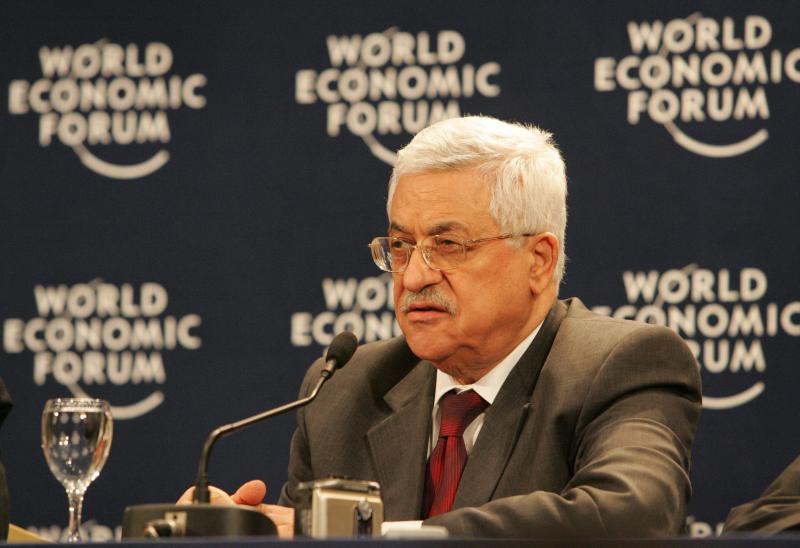
By Martin Bunton
It may be premature to completely write off the recent round of the US-sponsored Israeli-Palestinian peace process. The talks faltered earlier this month when Israel failed to release a batch of prisoners, part of the initial basis for holding the negotiations launched last July. The rapidly disintegrating diplomacy may yet be salvaged. But the three main actors have already made it known they will pursue their own initiatives.
They each may think that their actions will allow them to accumulate more leverage, maybe help position themselves in anticipation of a resumption of bilateral negotiations which, for over twenty years now, has been directed towards establishing a Palestinian state living peacefully alongside Israel. But it is also possible that the steps the parties take will instead deepen the despair of a two state framework ever coming to fruition.

Benjamin Netanyahu
The United States will focus their attention to other pressing issues, such as securing a deal on Iran’s nuclear program. Progress on this front may encourage, perhaps even empower, the Obama administration to resume Israeli-Palestinian negotiations later in its term. But the chances of their success will depend less on yet another intense round of shuttle diplomacy by US Secretary of State John Kerry, and more on whether a distracted Obama presidency will be prepared to pressure Israel to end its occupation. True, Obama enjoys the freedom of a second term presidency (unconcerned about the prospects of re-election). So far however he hasn’t appeared at all inclined to challenge Israeli prime minister Benjamin Netanyahu.
As for Israel, the Netanyahu government will take steps to make life even harder for Palestinians under occupation, and no doubt further entrench its settlement infrastructure in the West Bank, the territory on which Palestinians want to build their own state. Netanyahu, now one of the longest serving prime ministers in Israeli history, has provided very few indications that he is willing to enable the Palestinians to build a viable and contiguous state. He appears confident that the status quo is tenable, and that occupation and settlement of the West Bank can continue to violate international law without facing any serious repercussions. The more likely outcome of such complacency, however, is the irrevocable damage inflicted on the prospects of a two state solution and the harm done to Israel’s security, possibly subjecting it to a wide ranging international boycott movement.
Meanwhile, the Palestinian government, led by Mahmoud Abbas, will desperately strive to ensure that the breakdown of talks not lead to the collapse of his Palestinian Authority. Abbas may seek to use this opportunity to lessen the overall reliance on US sponsorship and achieve Palestinian rights in international bodies such as the UN and the International Court of Justice. This move may placate the growing number of Palestinians who until now have angrily dismissed Abbas’ participation in American-sponsored bilateral negotiations as doing little more than provide political cover to the on-going Israeli occupation, begun almost 50 years ago. But the majority of Palestinians will continue to disparage of how the pursuit of their national project has been paralysed by the weakness and corruption of their leaders and the absence of a unified government and coherent strategy.

Mahmoud Abbas
Though no side wants to be blamed for the collapse of negotiations, it is easy to see how a cycle of action and recrimination could scupper all attempts to revitalize them. More to the point, however, is to ask whether the steps taken will end up burying the very prospects of a two-states solution to the century long conflict which the negotiations are supposed to achieve.
Martin Bunton is an Associate Professor in the History Department of the University of Victoria and author of the recently published The Palestinian-Israeli Conflict: A Very Short Introduction (Oxford University Press, 2013).
The Very Short Introductions (VSI) series combines a small format with authoritative analysis and big ideas for hundreds of topic areas. Written by our expert authors, these books can change the way you think about the things that interest you and are the perfect introduction to subjects you previously knew nothing about. Grow your knowledge with OUPblog and the VSI series every Friday, subscribe to Very Short Introductions articles on the OUPblog via email or RSS, and like Very Short Introductions on Facebook.
Subscribe to the OUPblog via email or RSS.
Subscribe to only current affairs articles on the OUPblog via email or RSS.
Image credits: (1) Benjamin Netanyahu. Public domain via Wikimedia Commons; (2) Mahmoud Abbas. By World Economic Forum from Cologny, Switzerland (AbuMazem). CC-BY-SA-2.0 via Wikimedia Commons
The post Kerry On? What does the future hold for the Israeli-Palestinian peace process? appeared first on OUPblog.

By Amanda H. Podany
In President Obama’s speech last December when he received the Nobel Prize, he observed that, “War, in one form or another, appeared with the first man. At the dawn of history, its morality was not questioned; it was simply a fact, like drought or disease—the manner in which tribes and then civilizations sought power and settled their differences.” This comment almost seems to need no supporting evidence; it’s just common knowledge and common sense. And, for the most part, it’s true. That point, though, about war being the way that ancient civilizations “settled their differences”—that isn’t in fact the whole story. Ancient kings could, and did, send their armies into battle against one another. But some of them also talked to one another, wrote letters, sent ambassadors back and forth between their capitals, and drew up peace treaties. Sometimes, as a result, they avoided war and benefited from peaceful alliances, often for decades at a time.
Recently, as is so often the case, the focus of American diplomatic efforts has been on the Middle East. In a recent meeting, President Obama and Israeli Prime Minister Netanyahu reaffirmed the relationship between the US and Israel, then President Obama telephoned Palestinian President Mahmoud Abbas to voice his support for Abbas as well. Just days before that, Vice President Biden had met with Prime Minister Maliki in Iraq. It might surprise some modern political observers to learn that the invention of diplomacy probably took place in the Middle East over 4,300 years ago and that diplomatic interactions flourished there throughout the centuries of ancient Mesopotamian civilization, long before the era even of the Greeks and Romans. Affirmations of alliance and friendship similar to those spoken by President Obama and his allies in the Middle East can be found in ancient cuneiform documents between the kings of Egypt and Mittani (now Syria) and between the kings of Hatti (now Turkey) and Babylonia (now Iraq). And just as, today, President Obama relies on his envoy George Mitchell or Secretary of State Hillary Clinton to set the groundwork for agreements among Middle Eastern countries and the United States, so ancient leaders depended on their envoys for exactly the same reason.
Like modern envoys, these ancient ambassadors traveled to foreign lands, accompanied by translators and assistants. Like Mitchell or Clinton, the ancient officials often found themselves walking the line between assertiveness and compromise, between representing their government and taking a measure of control in negotiations, between accepting formal gestures of friendship and not wanting to be seen as favoring one ally over another. Fortunately for us, they left copious records of their diplomatic encounters.
For example, 3,350 years ago, a man named Keliya represented the king of the Mittanian Empire, in ancient Syria, traveling regularly to the court of the powerful Egyptian pharaoh Amenhotep III. Prior to his time, Egypt had been an enemy of Mittani for almost a century, starting around 1500 BCE. Egyptian kings had invaded Mittani, looted cities and taken back prisoners and booty. Mittani, in turn, was no vulnerable victim. It too had been expanding aggressively into neighboring lands. But around 1420 BCE the two lands made peace and instigated an era of extensive diplomatic contact. Other former enemies of Mittani—Hatti in what is now Turkey, and Babylonia in what is now Iraq—joined in as well. The great kings saw themselves as “brothers,” or equals, and they relied on their ambassadors, like Keliya, to keep communication open between them. Thanks to such men, what ha
Elvin Lim is Assistant Professor of Government at Wesleyan University and author of The  Anti-intellectual Presidency, which draws on interviews with more than 40 presidential speechwriters to investigate this relentless qualitative decline, over the course of 200 years, in our presidents’ ability to communicate with the public. He also blogs at www.elvinlim.com. In the article below he looks at the election in Iran. Read his previous OUPblogs here.
Anti-intellectual Presidency, which draws on interviews with more than 40 presidential speechwriters to investigate this relentless qualitative decline, over the course of 200 years, in our presidents’ ability to communicate with the public. He also blogs at www.elvinlim.com. In the article below he looks at the election in Iran. Read his previous OUPblogs here.
Let me be the first to admit that I don’t know if the recent Iranian “election” was fraudulent, but the faith some pundits have placed on the “evidence” for their conviction that it was gives me pause.
The elections certainly weren’t free and fair, not least because the regime had hand-picked the slate of candidates, but we are unlikely to ever know that straight-up fraud was involved or if voting irregularities were of a higher frequency than those we have routinely taken for granted even in this country. Our failure to contemplate even the possibility that many a dictator has been democratically elected is a dangerous democratic hubris that has shaped and sometimes thwarted our foreign policy.
I am not asserting that the Iranian election was definitely legitimate, only that it is at least remotely possible that it was. At least two independent pollsters agree, and have offered the illuminating factoid from their poll that the only demographic group that found Hossein Mousavi leading Mahmoud Ahmadinejad were graduates and those with high-incomes. (That is to say, they are people most likely to resemble western spectators still staring at the final vote tally in disbelief.) Yet Christopher Hitchens would have none of it and Steve Clemons has decided that there will be blood. But is the blood that Clemons not implausibly predicts will ensue the result of the subversion of democracy in the Iranian electoral process or its success?
Shutting down the media may be egregiously non-democratic, but it is different than creating ballots out of thin air. The reason why this distinction matters is that we must learn to contemplate why millions of people around the world would want to rally behind fanatical leaders who hold such spectacularly repugnant positions as denying the holocaust. This has happened so many times before that it makes our failure to accept its possibility even more revealing of the depth and scope of our mind-block: consider the cases of Gamal Nasser (Egypt), Hugo Chavez (Venezuela), Robert Mugabe (Zimbabwe), Jerry Rawlings (Ghana), Slobodan Milošević (Serbia), and now, possibly, Mahmoud Ahmadinejad.
Democracy is messy, and it is not naturally or dialectically inclined towards human rights, western liberal ideals, or the best candidate according to our standards. Neo-conservatives in America positing that the Iraqi people would welcome our troops as liberators back in 2003 have had to learn the hard way the costs of believing what they wanted to believe. In an analagous way, today’s pundits have been so quick to assert that the Iranian people in their post-election riots have exposed the charade of their recent “elections,” but maybe it is democracy itself that has outwitted the pundits. To understand the unpredictable and poigant path of democracy and democratization in the world, those of us who believe in democracy must urgently and honestly contemplate the number of times we have been hoisted by our own petard.







